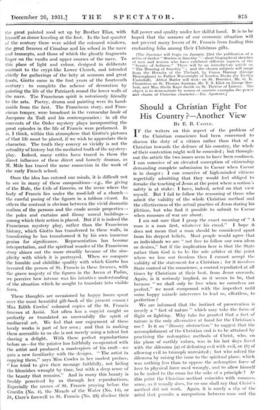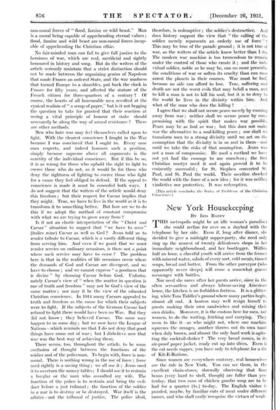Should a Christian Fight For His Country ?—Another View
BY E. B. CASTLE.
V the writers on this aspect of the problem of -I- the Christian conscience had been concerned to discuss the duty of a citizen rather than that of a Christian towards the defence of his country, the whole of their contention might well be conceded ; but through- out the article the two issues seem to have been confused. I can conceive of an elevated conception of citizenship demanding complete submission to Caesar when Caesar is in danger ; I can conceive of high-minded citizens regretfully admitting that they would feel obliged to forsake the teaching of Jesus at the point where a nation's safety is at stake: I have, indeed, acted on that view myself. But I fail to follow the reasoning of those who admit the validity of the whole Christian method and the effectiveness of the actual practice of Jesus during his lifetime, but who find it possible to submit to Caesar when rumours of war are about.
I am not sure that I grasp the exact meaning of " A man is a man first, whatever his creed." I hope it does not mean that a man should be considered apart from his deepest beliefs. Most people would agree that as individuals we are " not free to follow our own ideas or desires," but if the implication here is that the State rather than God is to be the sole arbiter at the point where we lose our freedom then I cannot accept the validity of the statement for a Christian ; for it involves State control of the conscience, a control repudiated at all times by Christians at their best, from Jesus onwards. Again, is it seriously implied, as it seems to be, that because " we shall only be free when we ourselves are perfect," we must compound with the imperfect until some happy miracle intervenes to lead us, effortless, to perfection ?
We are informed that the instinct of preservation is merely a " fact of nature " which may take the form of flight or fighting. Why take for granted that a fact of nature is the only alternative at hand for the Christian's use ? Is it an "illusory abstraction" to suggest that the accomplishment of the Christian end is to be attained by practising the redemptive methods of Christ, who, on the plane of earthly values, was in his last days faced with the dilemma (a) of defeating evil with evil, or (b) of allowing evil to triumph unresisted ; but who solved the dilemma by raising the issue to the spiritual plane, which was nothing less than to oppose the redemptive force of love to physical force used wrongly, and to allow himself to be nailed to the cross for the sake of a principle ?
this point the Christian method coincides with common sense, as it usually does, for no one shall say that Christ's method did not work. Again, it is surely a slip of the mind that permits a comparison between man and the non-moral forces of " flood, famine or wild beast." Man is a moral being capable of apprehending eternal values ; Hood, famine and wild beast are non-moral forces incap- able of apprehending the Christian ethic.
No fair-minded man can fail to give full justice to the heroisms of war, which are real, sacrificial and rightly honoured in history and song. But do the writers of the article seriously maintain that a strict distinction should not be made between the organizing genius of Napoleon that made France an ordered State, and the war madness that turned Europe to a shambles, put back the clock in France for fifty years, and affected the stature of the French citizen for three-quarters of a century ? Of course, the hearts of all honourable men revolted at the cynical realisM of " a scrap of paper," but is it not begging the question to take for granted that their reaction at seeing a vital principle of honour at stake should necessarily be along the way of armed resistance ? There are other methods.'
Men who hate war may feel themselves called upon to fight. With the -clearest conscience I fought in the War becauSe I was convinced that I ought to. Every sane man respects, and indeed honours such a position, simply because supreme aboVe all arguments is the sanctity of the individual conscience. But if this he so, it is- as wrong for- those who uphold the right to fight to coerce those who do not, as it would be for those who deny the rightness of fighting to coerce those who fight for a cause they feel obliged to defend. If the appeal to conscience is made it must be conceded both ways. I do not suggest that the writers of the article would deny this freedom ; but their respect for Caesar implies that they might. True, we have to live in the world as it is to transform it to something better. But how are we to do this if we adopt the method of constant compromise with what we are trying to grow away from ? '
Is it not an elastic interpretation of the " Christ and Caesar" situation to suggest that "we have to serve" (italics mine) Caesar as well as God ? Jesus told us to render tribute to Caesar, which is a vastly different thing from serving him. And even if we grant that we must render service on ordinary occasions, is there not a point where such service may have to cease ? The problem here is that in the realities of life occasions occur where the demands of God and Caesar are divergent, and we have to choose ; and we cannot express " a goodness that is divine " by choosing Caesar before God. Unfortu- nately Caesar's view of " when the matter in question is one of truth and freedom " may not be God's view of the same matter ; nor may it be the view of the educated Christian conscience. In 1914 many Caesars appealed to truth and freedom as the cause for which their subjects were to fight. If the subjects of the German Caesar had refused to fight there would have been no War. But they did not know ; they believed Caesar. The same may happen to us some day ; but we now have the League of Nations—which reminds me that I do not deny that good things have come out of war ; but I disbelieve now that war was the best way of achieving them.
There seems, too, throughout the article, to be some confusion of thought between the functions of the soldier and of the policeman. To begin with, force is non- moral. There is nothing wrong in the "use of force ; force used rightly is a saving thing ; we all use it ; Jesus used it to overturn the money tables; I should use it to restrain a burglar or the man who assaulted my wife. The function of the police is to restrain and bring the evil- doer before a just tribunal ; the function of the 'soldier in a war is to destroy or be destroyed. War itself is the arbiter--riot the tribunal of justice. The police ideal; therefore, is redemptive ; the soldier's destructive. And (lees history support the view that " the calling of the soldier merely represents an orderly use -Of force •" This may be true of the parade ground ; it is not true of war, as the writers of the article know better than I do. The modern war machine is too tremendous to 'remain under the control of those who 'create it ; and the indi- vidual soldier, noble as he may be, can no more prescribe the conditions of war or soften its cruelty than can mail arrest the planets in their courses. War mast be foul, because no side can afford to lose. True, suffering- and death are not the worst evils that may befall a man; and to kill a man is not to kill his soul, but it is• to deny to the world he lives in the divinity within him:- -And .what of the man who does the killing ? 1- • I agree that we shall not secure peace merely by running away from war ; neither . shall we secure peace by coni- promising with the spirit that makes war. possible. Peace may be as foul as war ; but this • does not make war the alternative to a soul-killing peace ; nor shall we transform men to a strong divinity until .we act on the assumption that the divinity is in us and in them—and until we take the risks of that assumption: Jesus was not a man of compromise. He used a method. we have not yet had the courage to use ourselves ;. the • first. Christian martyr used it and again proved it to be eminently successful ; for St. Stephen converted St. Paul, and St. Paul the world. Their sacrifice, shocked the world with the force of a new idea ; for it was neither vindictive nor protective. It was redemptive.
[This article concludes the Series of Problems of the' Christian Conscience.]

































 Previous page
Previous page